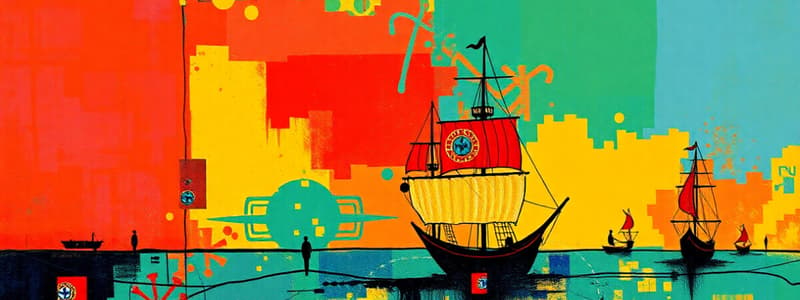Podcast
Questions and Answers
What misconception about the earth was commonly held before the Age of Exploration?
What misconception about the earth was commonly held before the Age of Exploration?
- The earth was an infinite plane
- The earth was a perfect sphere
- The earth was covered in water
- The earth was flat (correct)
Which technology was NOT developed during the Age of Exploration?
Which technology was NOT developed during the Age of Exploration?
- Caravel ships
- Compass
- Accurate maps
- Astrolabe (correct)
What was a primary motivation for the Age of Exploration?
What was a primary motivation for the Age of Exploration?
- Desire for knowledge about the stars
- Greed, power, and glory (correct)
- Exploration of local regions and cultures
- Interest in traditional philosophies
Which explorer is associated with reaching the southern tip of Africa during the Age of Exploration?
Which explorer is associated with reaching the southern tip of Africa during the Age of Exploration?
What was the significance of the Portuguese maps during the Age of Exploration?
What was the significance of the Portuguese maps during the Age of Exploration?
What was one reason Columbus sailed west in 1492?
What was one reason Columbus sailed west in 1492?
Which of the following was NOT a result of the Portuguese exploration?
Which of the following was NOT a result of the Portuguese exploration?
Why did Spain support Columbus's expedition?
Why did Spain support Columbus's expedition?
What was the unexpected result of Columbus's voyage?
What was the unexpected result of Columbus's voyage?
Which of the following was a consequence of the Columbian Exchange?
Which of the following was a consequence of the Columbian Exchange?
What impact did Columbus's arrival have on indigenous peoples?
What impact did Columbus's arrival have on indigenous peoples?
Which civilizations were notably destroyed due to European colonization?
Which civilizations were notably destroyed due to European colonization?
What did Thomas Hobbes advocate in terms of government?
What did Thomas Hobbes advocate in terms of government?
Which period is regarded as the peak of the Enlightenment?
Which period is regarded as the peak of the Enlightenment?
Which thinker is known for a pessimistic view of human nature?
Which thinker is known for a pessimistic view of human nature?
What role did the Renaissance play in the development of the Enlightenment?
What role did the Renaissance play in the development of the Enlightenment?
Flashcards are hidden until you start studying
Study Notes
Age of Exploration
-
Before the Age of Exploration, many Europeans had misconceptions about the world, believing it was flat, full of monsters, and smaller than it actually was.
-
The Age of Exploration was driven by several factors including:
- The desire for new trade routes to Asia.
- The pursuit of wealth, power, and glory.
- The motivation to spread religion.
- The demand for spices and other exotic goods.
- The development of new technologies, particularly the caravel, which was a faster, stronger, and more maneuverable ship.
- Improved navigation tools including the compass, log and line, and accurate maps.
-
Key Portuguese Explorers:
- Prince Henry the Navigator: Explored the African coast as far as Sierra Leone.
- Bartholomew Diaz: Reached the southern tip of Africa.
- Vasco de Gama: Successfully reached Asia by sea, opening up trade routes.
-
Portugal's explorations resulted in:
- The establishment of trade links with Africa, leading to the slave trade and the acquisition of gold.
- The assertion of Portuguese control over vast stretches of the African coastline.
-
Portugal brought back valuable goods from Asia including spices, silk, and precious stones.
Age of Exploration: Spain and the Americas
-
Spain and Portugal engaged in intense rivalry for dominance and wealth during the Age of Exploration.
-
Spain's geographical location and shipbuilding expertise favored them for Atlantic exploration.
-
Christopher Columbus's 1492 voyage to the west was motivated by:
- The desire to find a faster route to the riches of Asia.
- The need to circumvent Portuguese control over existing sea routes.
- The support of King Ferdinand and Queen Isabella of Spain, who sought imperial expansion and wealth.
-
The voyage resulted in:
- The "discovery" of the Americas, though Columbus mistakenly believed he had reached Asia.
- The initiation of European colonization of the Americas, leading to the Columbian Exchange: a widespread transfer of plants, animals, cultures, technologies, and ideas between the Americas and the Old World.
- The devastating impact on indigenous populations, including the spread of European diseases, enslavement, and dispossession of their lands.
The Impact of Exploration
- European exploration resulted in the destruction of native civilizations, such as the Maya and Inca.
- Native populations were robbed of their lands and subjected to harsh exploitation and forced labor by European colonists.
- Native peoples were decimated by European diseases to which they had no immunity.
- The Spanish, known as Conquistadors, conducted brutal conquests in South America.
- Hernando Cortes conquered the Aztec Empire, and Francisco Pizarro conquered the Inca Empire.
The Enlightenment
-
The Enlightenment, a period known for its emphasis on reason, rationality, and human rights, began in the mid-17th century and reached its peak in the 18th century, primarily in France.
-
The Enlightenment built upon the foundations laid by the Renaissance and the Reformation.
-
The Renaissance, which began in Italy and spread across Europe, witnessed a renewed interest in classical philosophy, science, and the arts.
-
The Enlightenment thinkers who significantly shaped intellectual discourse included:
- Thomas Hobbes
- John Locke
- Jean-Jacques Rousseau
- Baron de Montesquieu
- Voltaire
-
Thomas Hobbs argued for absolute power in government and held a pessimistic view of human nature.
Studying That Suits You
Use AI to generate personalized quizzes and flashcards to suit your learning preferences.



